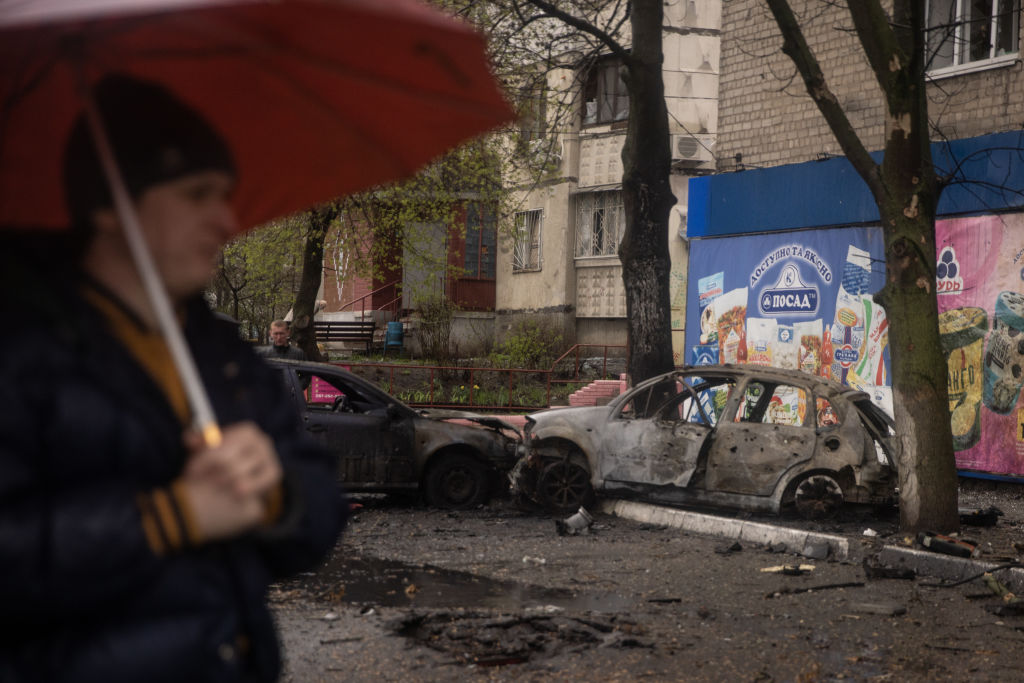
KHARKIV, UKRAINE – APRIL 18: A man surveys damage after a Russian artillery strike struck a residential building on April 18, 2022 in Kharkiv, Ukraine. After Russian forces retreated from areas around Kyiv, recent reports point to a new offensive as Russian forces are regrouping in the eastern part of the country bringing fears of an escalation of violence. (Photo by Chris McGrath/Getty Images)
Interview by Ben Wray
The Ukraine war is a geopolitical crisis with truly global repercussions — with some of the most severe felt in the Global South. Many in the Middle East and Africa face major shortfalls in the food supply.
Few are better able to explain the war’s repercussions on the Global South than renowned Filipino scholar and activist Walden Bello. Currently teaching at Binghamton University, Bello is the author of over twenty books, the most recent being Counterrevolution: The Global Rise of the Far Right and Paper Dragons: China and the Next Crash.
Founder of the activist think tank Focus on the Global South, for decades Bello has been one of the world’s leading critics of imperialism and globalization. He was a member of the Philippine Congress until 2015 and is currently running for vice president of the Philippines in an election set for May 9. He spoke to Benjamin Wray for Jacobin.
BR | The war in Ukraine has been ongoing for almost two months now. What’s your assessment of the situation and where it is likely to go from here? And what do you make of the reactions to the war in the Global South in particular?
WB | First of all, it’s really a tragic development. I fully agree with the UN General Assembly in condemning Vladimir Putin’s invasion and asking for a peaceful settlement via negotiations to end the invasion. At this point, Russia and Ukraine seem to have reached a stalemate, which is all the more reason for negotiations to really begin seriously now. So far, I don’t think the negotiations have been taken seriously by the Russian side. It’s time to halt the invasion and for Russia to withdraw its troops from Ukraine.
I think that most countries in the Global South have condemned Russia’s invasion but have been very hesitant to go beyond that, at this point, and be dragged into a US-NATO-led bloc. I think this is a recognition of three things. One is that it was partly NATO’s expansion right up to the borders of Russia that created the conditions for Putin’s countermove. This push to get countries on the border with Russia into NATO has been going on since 1994.
The West, and in particular the United States, has been involved in regime change in Ukraine, especially with the Maidan uprising in 2014, very much linked to fascist groups. And now this is being used by the United States for a real drive to regain its primacy as the global hegemon, seeking to rescue its tattered reputation after its defeat and withdrawal from Afghanistan, which was also a NATO defeat.
So there has been great hesitation in the Global South to get on the US bandwagon. I think the big push from the Global South is just to make sure that negotiations for peace start. Already what seems to be negotiable is neutrality on the part of Ukraine, and to assure Russia that it would not participate in NATO-led moves against Russia. My sense at this point is that neutrality in Ukraine and a number of the other countries on Russia’s border might be the best solution.
This is the time to really push for peace, because there’s a stalemate. I think Putin needs an opportunity to save face, and I think the Ukrainians want to show the world that they successfully resisted the invasion. So the first step is a cease-fire. Then there will be hard negotiations over the Donbas region, where there is a big Russian-speaking population, but I think there can be a political solution to that issue, it’s not irresolvable. There can be a solution where those areas remain part of Ukraine, but at the same time rights are granted to the big Russian minority, and the security concerns of Russia are also satisfied.
BR | The double standards in Western responses to the war is something that some on the Left in the West have been drawing attention to. The fact that Russia is sanctioned while the Saudi war in Yemen is supported; that Ukrainian armed resistance is glorified while Palestinian armed resistance to occupation is deemed terrorism. Presumably those watching from the Global South are acutely aware of these hypocrisies.
WB | Yes, I think this is one of the reasons why Global South countries are keeping a distance from the US efforts to drag them onto Washington’s side. Definitely the double standards in relation to Ukraine versus the Iraq War, the civil war in Syria, the Palestine-Israeli long war, and the Saudi genocidal war in Yemen, that is all very clear in the Global South and there is an awareness of the real historical record. We won’t be duped.
This is why trying to create a unified anti-Russian alliance isn’t going to work. Everyone knows there are clear double standards and the United States is really using the Ukrainian crisis to reassert its hegemony. I think Washington was hoping that somehow it would be able to reconstruct the past and create amnesia about what happened in the Middle East with its wars there, but that hasn’t worked.
BR | China’s reaction to the war has been heavily criticized in the West. It has been accused of providing an economic and political lifeline to Putin. At the start of the war, there was even talk that maybe China will see Russia’s invasion as setting a precedent for China to occupy Taiwan. What do you make of that?
WB | China has been very careful. It hasn’t condemned Russia, but at the same time it has not made any political, military, or economic moves that would indicate that it is moving substantially to take Russia’s side. I think even US authorities and economic analysts are finding it very hard to find evidence of China intervening economically on Russia’s side. We would have heard that being trumpeted by now if it was the case. Diplomatically, China has allied with Russia, but it has been very careful about not legitimating the Russian invasion.
The situation with Taiwan has a big difference. In Ukraine, there’s been no treaty between the United States and Ukraine, or Ukraine and any other country. So that sort of situation did not exist in the same way as it exists in Taiwan. The United States is tied to Taiwan through various major economic, political, and military treaties. China would be foolish to try to invade Taiwan, because that would provoke a US military response, and the US could point to the treaties in place since the early 1950s to justify such a response.
China would be crazy to sacrifice the economic and diplomatic gains it has made with Global South countries by invading Taiwan. So I think, at this point, China is satisfied with the One China policy, and the United States, in fact, also supports that policy, which recognizes the government in Beijing as the only legitimate government of China. China is satisfied with the status quo, but propagandistically has to continually reassert that Taiwan is part of China; it would be a big diplomatic setback for Beijing if it suddenly went quiet on this issue.
So I would say that an invasion of Taiwan is not in the cards, and China would be crazy to do it. The South China Sea is crawling with American power, and the Taiwan straits are avenues for US ships. We are talking about the most powerful navy in the world, concentrated on containing China in the South China Sea and the Taiwan Straits.
That’s a military force that China would not dare to try to provoke, and indeed it has not. China’s defense spending in recent years has really been quite low. The US has consistently, in the last few years, spent three times what the Chinese are spending. If the Chinese were really determined to match the US militarily, you would have seen a much more significant increase in their military spending. If you look at aircraft carriers — really key if you are going to have a naval conflict — China only has three, and they are old, Soviet-era designs. So you have 1970s aircraft technology against the state-of-the-art USS Gerald R. Ford — a complete mismatch.
BR | Some commentators have argued that Western sanctions on Russia are accelerating de-globalization and leading to the breakup of the world economy into two camps, one based around Beijing and the other around Washington, in a new Cold War–type situation. What’s your perspective on that?
WB | I think Washington wants to create a situation where financial and economic sanctions against Russia really hurt the Russian economy, and I think it’s being seen that these are a double-edged sword, because it’s also hurting the West. Europe has to be very careful, because it’s so heavily dependent on Russian energy supplies, and it cannot rely on US supplies, especially when winter comes. I doubt very much that the energy supply lines between Russia and Europe are going to be cut to any great extent.
I think the sanctions will hurt Russia, but probably not as much as the West would like. Compared to the likes of Iraq or even apartheid South Africa, Russia is a much bigger economy and has so many important ties to the Global South economically. So those precedents are not necessarily good ones, because Russia is a much bigger actor. And it could have a counterproductive effect, because even the Western press is saying that this effort to economically isolate Russia is receiving a backlash there, in the sense of stoking nationalism in support of Putin. There has, of course, been a brave antiwar resistance against Putin in Russia, but I think many Russians are caught up in this nationalist frenzy.
My sense is these sanctions are a type of warning, and the warning is really for China. The message is, “If you ever get in a serious struggle with the West, this is what you are going to face.” China knows that, and that’s why it’s not going to be provoked into any sort of precipitous action, at this point, that would trigger that type of sanctions.
Russia is much more vulnerable to economic and financial sanctions than China, because Beijing is so much more sophisticated in terms of all the ties it has developed with the Global South economically. Moreover, the US economy is so greatly dependent on production capacity built in China by transnational corporations, which is then exported to the United States. So sanctions would not work to the same degree against China as they have against Russia.
I think that the big winner in this whole situation could be China. It’s relatively well insulated at this point from the fallout of the Ukraine war, it has its own issues in terms of trying to prevent the spread of COVID, but it does seem that, in political, economic, and foreign policy terms, it is coming out of this much better than the United States. The United States and Europe have been exhausting themselves in their effort to isolate Putin, and I think China is faring much better, not being one of the main participants in this conflict.
BR | The war has accentuated the global inflation crisis. The Middle East and Africa in particular import a lot of their wheat from Ukraine and Russia. Ghana has raised its interest rates to 17 percent to try to reduce inflation. What’s your analysis of the economic situation in the Global South?
WB | For various reasons, inflation is on the rise, both North and South. Inflationary pressures were already there, owing to the problems emerging out of the COVID-19 pandemic. A lot of the inflationary pressures came from dislocations in the global corporate supply chain, and I think one of the lessons is about the vulnerability of these supply chains, not just to war but also to plagues and extreme weather. One of the results I expect is that many countries will move away from this dependence on global supply chains and begin to look more at regional cooperation agreements.
Inflation has been accelerated by the war, especially regarding wheat and oil. What is the effect of monopoly control by oil-producing countries and what is the effect of war? That is very hard to disaggregate. Because even when the war stops, the oil-producing countries will want the price to stay very high. I doubt you will see a drop in prices like at the beginning of COVID, when they fell over 50 percent in many cases. I think they will stabilize at a lower level than now, but certainly they won’t fall dramatically. And if they don’t go down significantly, that is likely to mean that the prices of commodities will also remain high. And that is also complicated by the global supply chain problem.
However, one factor whose impact on inflation has really been exaggerated is the increased government welfare spending due to the pandemic crisis. There was big deficit spending to prop up living standards, and now some economists are saying that’s the cause of inflation — I don’t think that’s true. I think the basic cause has been the problems in global supply chains, the rising price of oil, and the knock-on effects on commodity prices.
BR | We seem to be seeing a resurgence in support for NATO and for increased military spending in the West. As an anti-imperialist, does that worry you?
WB | In the United States, a lot of this is related to domestic developments. Joe Biden is using Ukraine and its attitude toward China to resolve the conditions of informal civil war that now exist in the United States. You have a very domestically polarized country, so being able to project an external enemy is one of the ways in which you can neutralize Donald Trump’s base and get some semblance of national cooperation going. I don’t think that’s really going to work, but they will continue to press that agenda along with higher military spending. It’s already topping over $800 billion this year, and that’s likely to rise even more. What this underlines is the importance of the antiwar movement to really revitalize itself and for the left wing of the Democratic Party to take a much stronger anti-military stance and stop this frenzied nationalism that Biden is trying to create.
In Europe, there is certainly a shift in the direction of militarism, especially among liberal and conservative forces. We see Boris Johnson going over for photo-ops with Volodymyr Zelensky, and this war has been a big opportunity for him, given his real domestic problems. How long this nationalist moment will last, I don’t know, but I think people in the UK are less naive than Boris Johnson thinks.
As for mainland Europe, there is a great dependence on Russian energy, which will continue to be a problem. Germany under a Social Democratic leadership continues to be pliable to Washington, but I don’t think it’s quite the same as when Angela Merkel was there, in terms of a pro-US European voice. In France, we don’t know what’s going to happen: the National Rally with Marine Le Pen might win the second round of the presidential election, and, as we all know, the European far-right is more closely allied with Putin. Viktor Orbán in Hungary, another far-right figure who has just been reelected, is also more closely aligned to Russia.
So yes, there does seem to be a move for increased military spending and toward NATO. But the domestic situation in so many of these countries is so fluid that one cannot say that this will result in a strong alliance between the EU, the UK, and the United States. The short-term outcome might be a strengthening of NATO, but, in the medium to long term, we could see a weakening of the Western alliance.
I think that is the one thing that is being missed by most analysts when they look at the geopolitical situation of both the United States and Europe; you can’t just look at foreign policy and not bring domestic political struggles into your analysis. My sense is that that is the factor we really have to look at if we are going to see the long-term direction of the West in this new international scene.
*This article was originally posted at Jacobin Magazine in April 19, 2022, on this link here.









